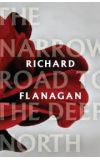
22 Jul 2014 01:36:31
Alwyn "Dorrigo" Evans, the novel's protagonist, is the officer in charge of J Force – a thousand-strong group of PoWs working on the infamous "Line", the Burma Railway. Comprising an assortment of Tasmanians and other captured Australian soldiers, Evans's motley troop of men exist as vividly drawn individuals, but also as a collective – comrades bound together through shared experience, through self-identification as Aussies, through being each other's "cobbers".
Flanagan is a fine writer (if we can forgive him the script of Baz Luhrmann's execrable Australia), and through the voices of a broad cast of characters, he takes us deep into the secret heart of the war. Dorrigo Evans's life provides the framework – from a Tasmanian childhood (including a sublime description of his first football game), through a torrid affair with his uncle's wife (where Flanagan makes a strong case for Bad Sex award recognition), to the war and its aftermath. The book is far more ambitious than the charting of one man's struggle, however. It demands of its reader huge leaps of sympathetic imagination, shifting perspective between the Australians and their Japanese captors, allowing each a measure of redemptive humanity.
The book takes us on vertiginous voyages backwards and forward in time, from the present of the war, to the past, to the postwar future where Evans, his comrades and the Japanese live a kind of half-life in the shadow of their wartime experiences. In less capable hands these scenes might be mawkish; Flanagan imbues them with extraordinary power. "After all, as Shugs later said, it wasn't really that bloody long, it just seemed to never bloody end. And then it ended… Then came the good years, grandchildren, then slow decline, and the war came to him more and more and the other 90 years of his life slowly dissolved. In the end he thought and spoke of little else – because, he came to think, little else had ever happened."
This is not an easy novel. The winding path of memory that serves for narrative structure can be disconcerting until we fall into its rhythm. There are scenes of violence on the "Line" that reminded me of The Part About the Crimes in Roberto Bolaño's 2666 – violence so relentless and brutal it threatens to swamp us. In one of the novel's central scenes, Evans recognises the serial nature of this violence, and how it has given shape to his life, attained a kind of philosophical weight: "he grasped the truth of a terrifying world in which one could not escape horror… the world did not change, this violence had always existed and would never be eradicated, men would die under the boot and fists and horror of other men until the end of time, and all human history was a history of violence." But always, for Flanagan, there is the possibility of redemption: in love, in friendship, in literature (the book's epigraph is a quote from Paul Celan: "Mother, they write poems"). Treading in fictional form the same territory and terrors as Eric Lomax's The Railway Man, Flanagan's novel also nods to Mailer's The Naked and the Dead and Tobias Wolff's In Pharaoh's Army. It is a novel of extraordinary power, deftly told and hugely affecting. A classic in the making.

